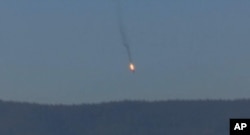Turkey's Security Council announced Thursday that the PYD Syrian Kurdish group and its YPG militia have no future in Syria. Ankara has warned it could intervene militarily.
Observers say Turkey has become alarmed about increasing Russian and U.S. support for the group and militia in their fight against Islamic State.
Ankara accuses the PYD/YPG of being offshoots of the Kurdish rebel group PKK, which Turkish forces are currently battling both domestically and by air in Iraq. Turkish President Recep Tayyip Erdogan this month promised to eradicate the PKK from the region.
The threats should be taken seriously, said political columnist Semih Idiz of Turkey's Cumhuriyet newspaper.
"Prime Minister [Ahmet] Davutoglu himself has said that if Turkey sees it necessary, it will take the same precautions against the YPG in Syria that it's taking against the PKK in Iraq," Idiz said. "So, in a way, Turkey has left the door open to conducting operations against the YPG."
Observers say Turkey’s political leadership is probably feeling emboldened by its success in excluding the PYD from Syrian peace talks scheduled for Friday in Geneva.
Syrian Kurdish gains
But Sinan Ulgen, a visiting scholar at the Carnegie Institute in Brussels, said Ankara’s hardening stance is also a reaction to recent military gains by the Syrian Kurdish forces, complicated by Turkey's downing of a Russian plane it said had crossed into its airspace.
"There is certainly a degree of unease in Ankara over these attempts by PYD to cross westwards," Ulgen said. "But after the downing of the Russian plane, Turkey has limited ability to project power in Syria for fear of provoking a military confrontation with Russia."
After the downing in November, Russia deployed a sophisticated anti-aircraft missile system in Syria. Moscow is also reportedly seeking to court Syrian Kurdish forces, which are already being supported by U.S. air power in their battle against the Islamic State.
Despite Ankara’s threats and its exclusion from the Geneva talks, the PYD remains in a strong position, columnist Idiz said.
"The military situation on the ground is going to determine the final outcome," he said. "And the YPG and the PYD are allied with America, and the war on the ground continues. And if the West reduces its backing to the Syrian Kurds, then Russia is going to step in."
YPG moving west?
There were signs Thursday that YPG leaders were on the brink of defying Ankara and crossing one of Turkey's “red lines” when it comes to the Syrian Kurds — a westward move from Kurdish positions in northeastern Syria.
YPG commanders confirmed to VOA a local Kurdish news report that they had drawn up battle plans to launch a ground offensive west of the Euphrates River to attack the Islamic State-held towns of Jarablus and Manbij, as well as Azaz, which is held by insurgent factions opposed to Syrian President Bashar al-Assad.
Turkish officials have warned frequently that an en masse trespass west of the Euphrates by Kurdish fighters would invite Turkish retaliation. In December, the YPG-dominated Syrian Democratic Forces (SDF) seized the October Dam on the Euphrates River, giving them access to the Aleppo countryside.
Some SDF fighters crossed west of the river. For face-saving purposes, the Turks accepted that the SDF fighters who actually crossed were Arabs and Turkmen and not Kurds, prompting some observers to speculate that the Turkish authorities were now prepared to tolerate an inevitable westward advance by YPG fighters to push IS militants out of Jarablus and Manbij, a feat Western and Gulf-backed anti-Assad rebel groups have been unable to do.
YPG commanders say that the goal of the offensive would be to cut IS fighters off from the border with Turkey, severing a logistical route Islamic militants use to ferry in foreign recruits and supplies. IS controls around 100 kilometers of the border between Jarablus and Azaz.
Not just Turkey
Syrian Kurdish forces accuse Turkey of having already made sporadic attacks against them along the border. If YPG forces continue to make military gains, while Turkish forces step up their battle against the PKK across Turkey’s predominantly Kurdish southeast, observers warn that the dangers of the internal conflict spreading farther into Syria are likely to grow.
And a YPG ground attack would risk more than Turkish retaliation.
Anti-Assad rebel groups also would most likely react violently in defense of territory they consider inherently Arab, not Kurdish.
In mid-January, Islamic factions favored by Gulf countries clashed with SDF forces around the village of Malkiya in Aleppo’s northern countryside, according to the Syrian Observatory for Human Rights, a monitoring group based in London that relies on information from a network of political activists.
On Monday, YPG forces started a bombardment of Jarablus with artillery shelling and mortar fire. “We bombed several military vehicles for IS, a Sharia court and a security center for the terror group. At least 21 terrorists were killed,” said YPG spokesman Nuraddin Gaban. He added: “Jarablus is one of our main targets.”






